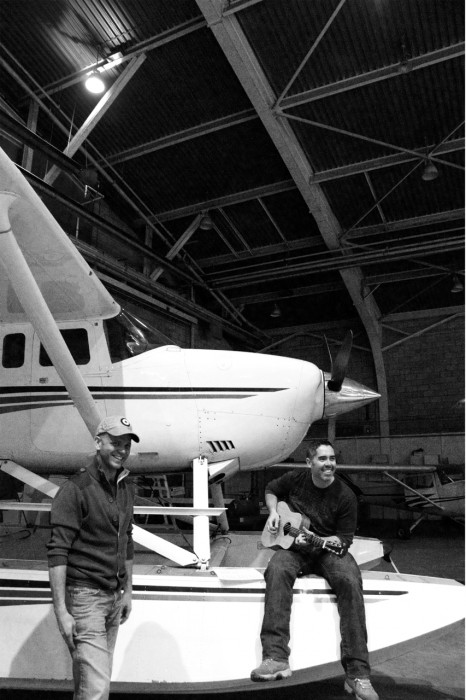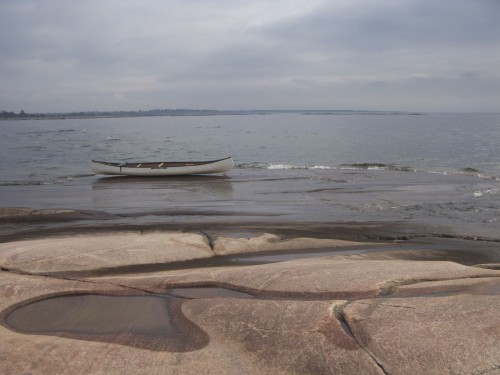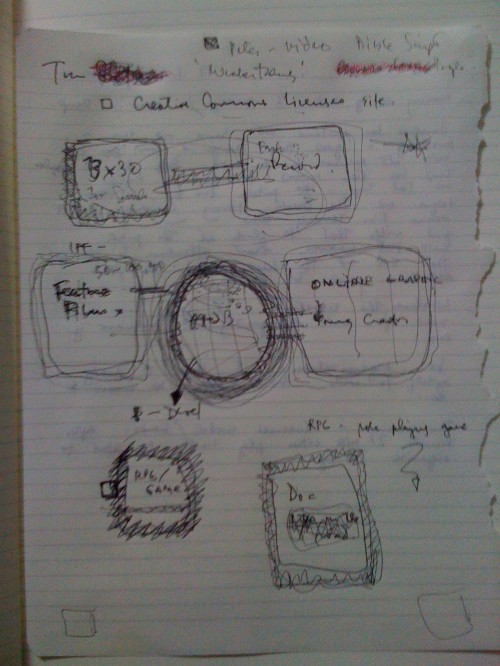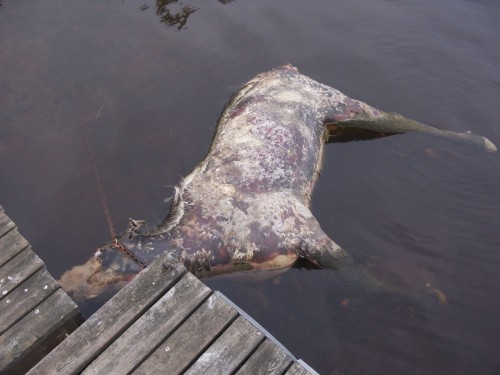Christopher Bolton is a Canadian writer, producer, and actor, best known for his award-winning comedy series, Rent-a-Goalie. A few months ago, Christopher — AKA “Bolts” — contacted me asking for feedback on his latest project’s transmedia strategy. After a few minutes of chit-chat and an exchange of development documents, I realized that the project, a comedic exploration of Canadian landscapes popular and physical, entitled In Search of Gordon Lightfoot, was much more than a TV series with a few transmedia extensions tacked on just for the hell of it; no, this was something different, something much more integrated — transmed ia from the get-go. And, as it happens, it was also something that sounded quite funny and more than a little community-minded in its direct engagement with audiences and Canuck mythology. Naturally, I wanted to be a part of it. A few web chats later, we came to an agreement — I would consult on the project and shadow Christopher as he worked his way through the development process, and in return he would share what he learned with me, here, in the form of a series of interviews.
This first interview is a snapshot of Christopher’s thinking as the project moves through the funding process and into the first stages of pre-production. It reveals a considered and well-informed view of transmedia and the new storytelling landscape. It is an inspired and often very funny view of the future of entertainment, and I look forward to speaking to Bolts more as his work on the project progresses.
You’ve worked in the Canadian film and television industry for a while now. What’s your background, and what’s changed since you got started?
My background is varied. Until my mid-20’s it was solely acting. In ’93 I took a stab at writing and that landed me at the CFC in 94 as a writer. I did the directing curriculum at nights and on weekends and directed my first two – and only two – short films there. In 2003 I teamed up with a fella goes by the name Chris Szarka and we formed a company to develop and ultimately produce a cable ½ hour comedy up here called Rent-A-Goalie. In there somewheres I did a few stints as A.D. and Props Man.
As for how it’s changed since I began…televisions are colour now and very crisp and clear.
It was during the production of RAG that I became interested in Transmedia though I didn’t know it was a concept with a name. I suggested ideas to the broadcaster, ideas intended to drive traffic to and from the mother ship – some UGC, a genre bending prequel movie, some mobile applications – but it was always met with a no. It was a licensing issue and I get that but…well…I’ll leave it there. I blame myself. I should have pushed harder.
When I began developing In Search of Gordon Lightfoot I met a woman named Jill Golick, a digital pioneer in Canada. She began my indoctrination into this world.
Man-oh-man, forget how the industry has changed since I started; in just 7 years, dated to when we began development on RAG, it has broken almost to the point of no-fixee. I was at a card table recently of smart broadcasting folk with impressive CV’s discussing the future of our industry. The hardcore estimate for conventional broadcaster life expectancy in Canada was 2 years and the optimistic guess, if you’re said broadcaster, was 10 years. Basis or not to such speculation I was rocked. The consensus was that cable isn’t going anywhere fast because subscription is consumer-choice. It just won’t look like pay cable does today.
The web has blown shit wide open. Access, audience contact and engagement, community building, social media, distribution platforms, the very nature of what content is (stop calling it a Television show for cryin’ out loud) is so drastically different that it needs to be called something new. There is a good and big explosion at the point that industries are colliding – tv/film/branding/communications/tech – and where the smoke clears is an opportunity to re-imagine and develop content specifically to meet the unique demands of all interested parties and, more importantly, audience. The excitement for content creators lay in the exploration of new ways to tell story. A fractured media landscape is exactly what I needed as it helps to make sense of how I think and speak.
This is a frontier and frontiers benefit the entrepreneurial spirit greatly. I think it was Ted Hope who said that it’s the era of Artist as Entrepreneur and it behooves anyone taking that notion seriously to look at how those industries conceive of and deliver content and will do in participation with one another.
The logline for my new company, Forty Farms, is…
The client is the brand is the consumer is the experience is the entertainment.
…and that could just as easily read…
The experience is the consumer is the client is the brand is the entertainment.
Ruminating on this one-hand-clapping-esque driver is a good way to get inside the headspace necessary for making resonant, profitable entertainment going forward.
What is In Search of Gordon Lightfoot?
ISOGL is the title of two of six platforms in an as-of-yet-unnamed Transmedia Project about searching for an identity, a sound, a connection to a landscape, and a warm dry spot to pitch camp for the night. The first is a 13 x 30 minute comedy that sees Ed Robertson (frontman for the pop-rock outfit Barenaked Ladies) and myself flying around Northern Canada in an iconic bush plane looking for reclusive rock legend Gordon Lightfoot. Why? Because he has something that belongs to us. We just miss him everywhere we look and become embroiled, instead, in some small town, wilderness related mayhem before a narrow escape back to the skies to search for another day. The second is a tribute record to the man himself. Our guest stars in the series will be well-known Canadian music acts who will do double duty – act their asses off for the show and then sing them back on covering one of Gordon’s tunes for the album. These two properties are designed for distribution together but that ain’t prescriptive.
The remaining platforms are a game, feature, feature documentary, and graphic novel. Our point of identification in the meta-narrative is a guy, a creative guy, who stumbles, flies, loves, fishes, hikes, and writes his journey. It’s a walk through time, media, story and Canada with a fella trying to make sense of it all. Taken together it will serve as a big ol’ love letter to this country as well as warm, beautiful, funny and musical showcase of Canada to the rest of the world. The idea is to entice more Germans – as if that were possible – to come canoe our rivers and lakes.
Do you conceive of the project as a show with a Transmedia experience, or a Transmedia experience that includes a show? Is there a difference?
I’m reluctant to answer this question because it implicates me by rendering the project’s history a little less pure than I’d like it to be. The series was to be my sophomore ½ hour effort. Discussions with broadcasters were frustrating me – one guy’s problem with it was that he didn’t like flying so he bumped on the aviation part – and I figured that it was the right time to dig in the dirt of new business models and alternative modes of storytelling. I began thinking of an extended narrative for Search, ideas I wanted to implement but that didn’t fit in the series as well as different platforms that interested me. Writing for gaming for instance has particular cache. Are you kidding me? No limits storytelling? It was like my head exploded and I knew my time in traditional would serve me well here because what that did teach me was restraint. Restraint, I think, is key to navigating a world as full of opportunity as No Limits Storytellingville.
That’s the long way round to saying that, though I didn’t conceive of it as such, I absolutely consider this project a Transmedia Experience that includes a show.
I love that you call it a Transmedia Experience because that is key to how I frame this thing. It’s a creative and production process experience and the user can consume it soup-to-nuts or in parts. Empowering the audience to participate breeds pride of ownership and I think people will respond to that. What’s really blowing me away is people contacting me with platform ideas of their own as well as reach-outs that I initiate bearing fruit as well. This dialogue between you and I is a prime example: a) it helps us both in our respective missions b) it is content c) it will drive traffic to our mutual benefit. That’s some performing shit in my opinion.
As to whether there is a difference between a Transmedia experience with a show or a show with a Transmedia experience? Abso-lute-ly and it’s as important a distinction there is in defining Transmedia. It’s essential that TM design be ground up rendering every platform essential to the broader stroked narrative. Tacked on properties will feel like tacked on properties and your audience will at best dock you points for that and at worse abandon the project altogether. It seems to be the mistake producers are making in trying to design additional platforms for their fleshed out traditional properties – done in this order it becomes re-purposed material as opposed to original, non-linear content that is platform-specific.
What got you thinking about developing a Transmedia strategy for Lightfoot? Why not do things the same way you’ve done them in the past?
What gets me excited about Transmedia is the belief that the present (past) model is broken and that the opportunities inherent in being an early adopter to this kind of storytelling are huge. It seems simple: a fractured media landscape begs a splintered approach and a savvy user demands that it be robust. I leapt at the chance to create within those parameters. And some of the best minds I know, people who’ve made good, albeit waning, livings in Traditional are meeting in dingy bars to discuss how to make ground-up changes in their industry because they don’t feel they have anything to lose. It’s electrifying to hear the talk. And it’s not griping ‘make the writer matter’ or ‘actors are people too’ stuff either. These are talented and frustrated professionals, who’ve read the writing on the wall, discussing a renovation of the system that values what they do and has everyone thinking creative + business + tech from step 1. Who was it said it feels like 1911 and we’re the guys learning that different angles and editing are good? Oh right, that was you. Spot on Mr. Watson. Makes me crave a cigarette and I don’t smoke.
Reminds me of a joke about lemon meringue pie. I’ll have my friend Jeremy deliver it to camera and post it on my site when I get a site.
Canadian TV productions have notoriously low operating budgets. How are you going to pay for all the different components of this project?
F@#ed if I know.
Kidding. Sort of.
Yes we have tiny budgets up here and they are getting tinier by the day. We shot Rent-A-Goalie for a half million bucks an episode in 3rd season and that was extraordinarily high then. Today you’d probably have to bring in a CSI for that. Not quite but, y’know, almost.
In my opinion the answer to low budgets is to go lower. Don’t try to make a $200,000 show look like a ½ million bucks because it’ll suck. Make a 100 K per episode show and don’t apologize for it. Don’t try to stretch the dollar. Don’t try to stretch anything. Just make the most awesome content you can possibly make with what you have and concentrate on what hooks – story. Necessity is the mother of invention and with today’s technologies you can make it beautiful for peanuts. The key is knowing how to make it beautiful and that is art as it’s always been. Ted Hope again – he tweeted recently that ‘A return to less could be more.’ Yes. Just plain yes indeed.
The agencies that help us make entertainment in Canada are trying hard to keep up with the changes and, on the business side of it, are thinking progressively. We’ve pitched the project to the Funds with no real ask other than a dialogue. We ask whether the model makes sense and how could they see being involved? They appreciate it because they’re trying to wrap their heads around new models as well and we appreciate the response because it helps us create accordingly. Assuming we get the Funds, and if we keep the thing indie-spirited, there will be shortages to make up but they aren’t prohibitively huge. For that we’re looking at brand relationships plus some crowd-sourcing options and a bit of private investment to top off. I’m not frightened by the financing plans yet. But then I’m the guy who writes fart jokes in these partnerships.
How has taking a Transmedia approach changed the way you’ve gone about raising development money and securing licensing agreements?
The absence of a broadcaster has cleaned rights up immensely. And, again, the wild west of the Internet means very few precedents so we’re kind of making it up as we go along. Talks with musicians, writers, performers have been positive – everyone seems to want to see it work. A western spirit of Kereitsu – a Japanese business model based on industries working with one another to the benefit of all – is what we’re looking to build. There’s power in that. The power of community.
We’ve received some development money from regular avenues for traditional deliverables like series bibles and pilot scripts for the 13 x ½ hr. I’m writing the feature script during the month of April as part of a month long script competition. With no dough attached to its development I am hungry to work completely and feverishly to reduce the time it takes to develop. That platform is a No-Budget film we want to make as a Canadian nod to the Mumblecore tradition. We were soft-offered some development dough for it but it would be recoupable so what’s the point? I’d rather put it on the screen down the road. That property sits with a different producer than the one who has the series, which is a different producer than the one who has the feature doc. So you see how the heavy lifting is s pread out while the creative remains central. So there’s a bit of my own money – well, my wife and children’s too – in play on this one but that’s not a bad thing because I’m positive we can make a business out of it.
Here’s a two-parter: 1) What role, if any, do you see for the audience in producing and developing content for Lightfoot? and, 2) as an artist, how do you feel about opening up parts of the creative process to audience participation?
It is my sincere hope that the audience will do the lion’s share of the work. My favourite thing, by far, of having a popular show was that, love it or hate it, everyone had something to say about it. Inviting them to voice those opinions netted us feedback and story fodder. When I began developing Lightfoot I continued to invite that input. Everyone I talked to had a Lightfoot story – some were first-person accounts, some were major life events with Lightfoot as the soundtrack and some were tales of mistaken identity. They were all fantastic though and enthusiastically told. There is one that stands out – a guy nearing 40 now told me about a Sunday morning in the early 80’s where he and a buddy were playing hockey in an alley, taking shots against a neighbour’s garage. The puck-on-metal clang is a very common ruckus up here but it might be a little much for a rock-star early on a Sunday morning. This grizzled dude walks out in his robe and asks the children, in a charming and patient manner no doubt, to stop interrupting his sleep. The storyteller’s friend told him that was Gordon Lightfoot. I told Gordon the story and he swore it was his dad who tromped around city alleys in his robe.
An aside re. the organics of this thing – that story got back to Gordon and Gordon commented on it. Commenting is content.
So I wondered if it was possible to formalize this relationship between creator and audience and that’s the plan for ‘Search’. We are opening up the process, inviting anyone who has been touched by the subject matter to chime in. I want tales of bush piloting gone wrong and small town yarns, the instances where a song played over a formative time in one’s life. And then we want to be invited to shoot in the places where the story was originally set. We want to engage the people who helped develop the content in producing it as well. Maggie Ancaster of Herring Neck, Newfoundland gets to be prop master for a day or two. The result here, we hope, is to make shooting the show as much of a celebration of this country and it’s people as the content is. Totally 360.
This isn’t a new idea. One of the great Canadian storytellers of this generation, Stuart McLean, has been doing exactly this forever and a day. His material resonates because, beyond being talented, he sits with the people and listens to them. Gordon too. He says it’s dialogues with the people who consume his art that shapes it. Sure, he loves to play because he loves to play but it’s more than that. It’s an exchange.
Writing tv and film in the traditional manner doesn’t offer that opportunity exactly.
I’ve been warned off what this means to me as an artist but I don’t buy it. There’s a quote from Martha Graham posted above my desk that says, paraphrased – don’t be a donkey, you’re no genius. You’re a dude who types for a living. Just stay open and let flow through you what will. What I want flowing through me are the stories of the people I want to write stories for. If I can conceptualize a boundary that resonates with people, inspiring them to tell their version, my job simplifies to merely taking good notes. And ain’t it nice for Maggie Ancaster to get a credit on some quality Canadian content? Story by: Maggie Ancaster has a good ring to it don’t ya think?
I made the name Maggie Ancaster up. Any similarities to any living persons, dead or alive…yadda yadda yah.
Are there any touchstones that serve as inspiration for this project?
Stuart McLean’s stories for sure. Properties that have been sent my way since I began talking about it – Murray McLauchlan’s ‘Floating Over Canada’ is a good example. Specific properties have specific inspirations: the series is homage to John Lurie’s ‘Fishing with John’; the feature is inspired by films like ‘Wendy and Lucy’ and ‘Old Joy’; the feature doc by Werner Herzog’s Encounters At The Edge of the World; the record was a Rick Rubin inspired thing; and the graphic novel is egged on by the likes of Yoshihiro Tatsumi and Seth.
Is this the future of TV?
It’s the future of entertainment for sure. The single media property is done and so are sloughs of other givens we ‘know’ about entertainment. The audience is now referred to as the user and respecting them as a client will take us a long way. The power they have in pressing little buttons is unprecedented and so creating experience and empowering them to participate are paramount moving forward. In the not so distant future Networks will be of people around people not corporations defining content and retaining sole authority to distribute it. Speaking of which…has anyone tackled the David and Goliath story in the new era? They should.
About Christopher Bolton: Christopher Bolton began acting in his teens appearing in feature films Global Heresy, Killing Moon, A Colder Kind of Death, Dead By Monday and The Third Miracle, as well as the Showtime television movies Hendrix and Our Fathers. Additional television credits include roles on the series Northwood, Mutant X, Blue Murder, Little Men, PSI Factor, La Femme Nikita, Street Legal and The Outer Limits. Bolton earned a Gemini nomination for his guest-starring role as ‘Joey Williams’ on the award-winning series Cold Squad.
His work in film and television led him to try his hand at writing. This effort landed him a spot at the esteemed Canadian Film Centre in the Resident Programme. He entered as a writer, but left having written and directed his own short film entitled The Tooth.
He then completed a two-year stint acting on the highly regarded Showtime Network television series Street Time. It was on Street Time in 2002 that he met producer Chris Szarka, forming a partnership to create and produce the multiple award-winning television series Rent-A-Goalie for Showcase.
Bolton is the executive producer, star and creator/writer of Rent-A-Goalie. He is represented by DF Management in the US and Celia Chassel/Gary Goddard in Canada. His new Transmedia Production House, Forty Farms, will launch in May, 2010.
[This interview is cross-posted at the fabulous Culture Hacker]
http://remotedevice.net/blog/trans-canada-transmedia-christopher-bolton%e2%80%99s-multi-platform-search-for-identity-sound-and-story/






No comments:
Post a Comment